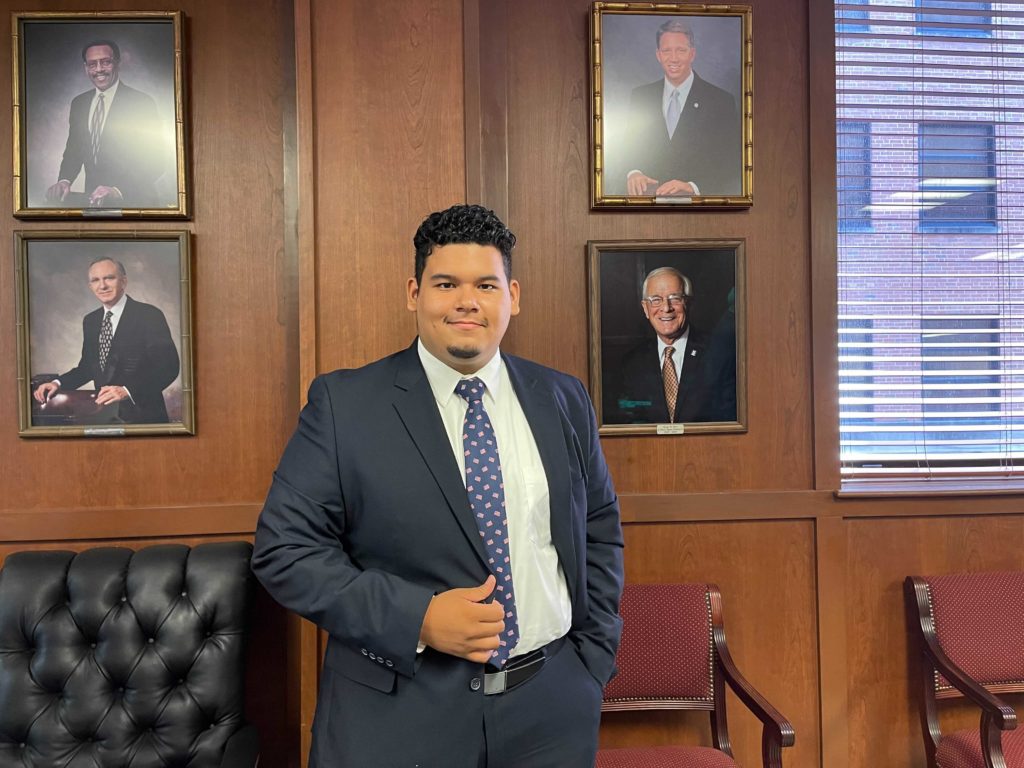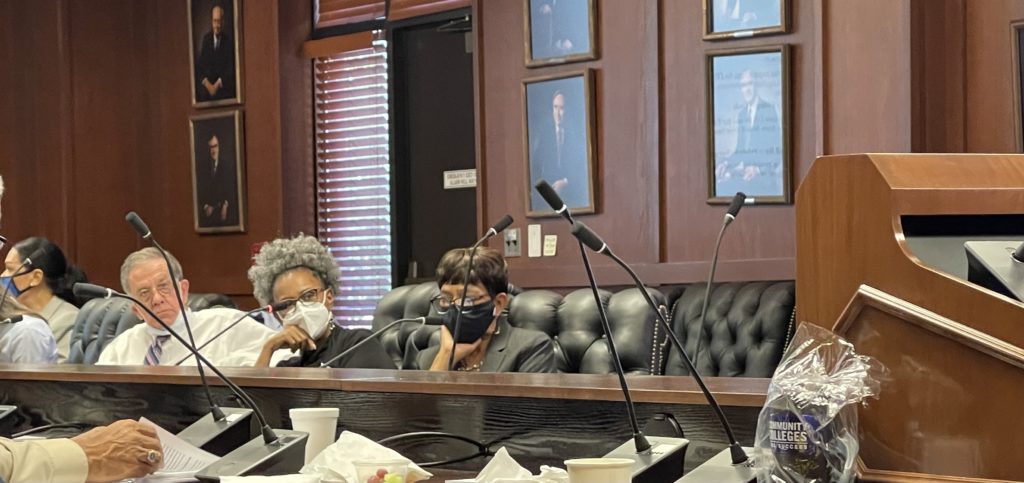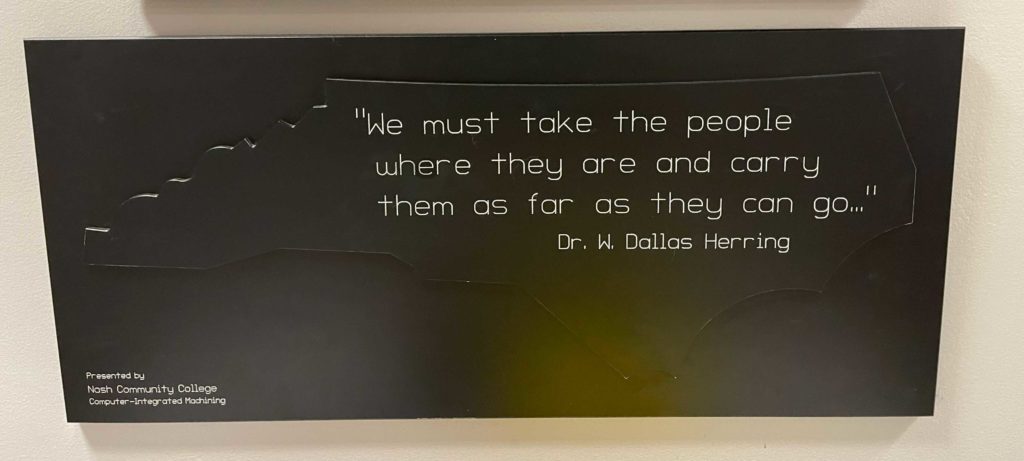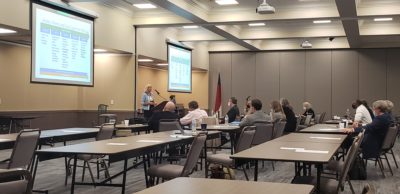|
|
The State Board of Community Colleges returned to the North Carolina Community College System (NCCCS) office on Oct. 14-15 for their monthly meeting. It was their first gathering in the State Board room since January 2020.
Board Chair Burr Sullivan welcomed two new board members: Tom Looney, appointed by the North Carolina Senate, and Gaston Early College High School student Nathan Vasquez, appointed by the North Carolina Comprehensive Community College Student Government Association (N4CSGA).

Slight uptick in enrollment
Sullivan opened Friday’s meeting by focusing on enrollment. He insisted that the Board and others pay particular attention to enrollment in counties that are depopulating.
“More than half of our counties are losing population, and we have a community college in every one of those counties,” Sullivan said.
NCCCS president Thomas Stith echoed Sullivan, saying that the strategic plan for the System must include focused efforts on enrollment.
According to Stith, the North Carolina Community College System has experienced a 27% decline in enrollment over the past 10 years. In 2020 alone, the System saw an enrollment decline of 11%.
Sign up for Awake58, our newsletter on all things community college.
But there is some hopeful news. Although preliminary, Stith reported initial fall 2021 FTE estimates, which are based on the number of accumulated student hours, are up about 1% systemwide.
“Interestingly enough, our smaller colleges are … seeing the greatest share of hefty increases at this point,” Stith said.
Stith mentioned several enrollment initiatives in his presentation to the Board, including the adult learner pilot program.
This past summer, the John M Belk Endowment, myFutureNC, and the Belk Center for Community College Leadership and Research announced a pilot project and outreach campaign, called NC Reconnect, with five North Carolina community colleges to attract adult learners to enroll in community college this fall.
The colleges used targeted efforts to reengage adult students who had previously been enrolled at their respective institutions and had completed 50% – 75% of a credential.
The Board will hear more about the adult learner initiative at their November meeting.

Diversity, Equity, and Inclusion report
The State Board approved three recommendations related to the Diversity, Equity, and Inclusion (DEI) report, which is the product of a year-long effort by the Diversity, Equity, and Inclusion task force.
In July 2020, Peter Hans, then-president of the North Carolina Community College System, appointed Dr. Don Tomas, president of Southwestern Community College, and then-president of Wayne Community College, Dr. Thomas Walker, to lead a new System Advisory Council Initiative on Diversity, Equity, and Inclusion.
According to the Board, the focus of the initiative was to identify institutional or policy-related inequities that limit opportunities for students, faculty, and staff, and make recommendations to address them. They were asked to specifically review the State Board Code and sample college policies that may negatively impact students of color. Additionally, the initiative was asked to develop guidelines for colleges to use to examine their own policies.
In addition to Drs. Walker and Tomas, the DEI task force included five other community college presidents: Dr. Mark Kinlaw (Rockingham Community College), Dr. David Johnson (Johnston Community College), Dr. Maria Pharr (South Piedmont Community College), Dr. Pamela Senegal (Piedmont Community College), and Dr. Janet Spriggs (Forsyth Technical Community College).
JFF Associates was hired to assist the task force and worked in collaboration with the Belk Center for Community College Leadership and Research and ASA Research.
The DEI task force presented three recommendations to the System Advisory Council in September 2021. The System Advisory Council includes members from the State Board, NC Association of Community College Trustees, and NC Association of Community College Presidents.
The System Advisory Council recommended and the Board approved the following:
- RDS (Residency Determination Service): Recommendation to examine the RDS process to determine what barriers may exist and seek ways to mitigate those impacts. Recommendation to share the request from the DEI task force for the elimination of RDS with the President’s Association legislative committee for consideration within the legislative agenda development process.
- State Board of Community Colleges Code: Recommendation for the System Office and the Policy and Governance Committee of the SBCC to propose updates to State Board code based on recommendations cited in the report provided by JFF.
- Student debt related to small fee-related charges: Recommendation for a working group to include both college and system office staff to provide guidance for colleges and suggest best practices for handling student small fee-related debt.
Before the conclusion of the DEI presentation, Board member Ann Whitford asked Mary Shuping to share context regarding RDS. Shuping is the former director of governmental affairs for NCCCS and now serves as the director of governmental and external affairs for the North Carolina State Education Assistance Authority (NCSEAA).
Shuping explained that RDS is a system that implements the law.
“Whatever the underlying law is in terms of establishing residency for tuition purposes, that’s what RDS does through an algorithmic process,” Shuping said. “To the extent that there are barriers, and I’m certainly not going to stand here and say that there aren’t barriers to students, whether they are residency barriers or others … it really is with the residency law more so than the RDS system which implements it.”
According to Shuping, the questions that students must complete through RDS follow the law in order to show that a student is a resident of North Carolina for tuition purposes.
While there have been updates through the years to the residency law and RDS, the DEI report indicated that in 2018-19 approximately 3,000 students began the RDS application but did not complete it. The report also highlighted particular student groups for which the RDS may be a significant barrier:
- Immigrants, regardless of legal status, but especially Deferred Action for Childhood Arrivals recipients, commonly referred to as “Dreamers,” and individuals with undocumented members in their household.
- Older students that may have difficulty accessing documentation.
- Youth separated from their parents.
Board members asked about the questions students had to answer when completing RDS.
Shuping told the Board she would provide a list of those questions along with an updated report that shows how many NC community college students stopped the RDS application before completing it. Shuping also said that she and her colleagues would be more than happy to help the Board and NCCCS in any way they can.
Shuping later asked the Board, “Is it time that we think about looking at the law and what the law requires?”
“As you sit through these meetings year after year, month after month, one word keeps coming up: barriers. We need to knock down every barrier that we legally can … Barriers are what’s holding this state back. Barriers are what’s holding education back.”
– Bobby Irwin, State Board member
You can read the full Diversity, Equity, and Inclusion report here.

A new program at Wayne Community College
A new program is set to launch at Wayne Community College. The Board approved North Carolina’s first associate degree program specializing in artificial intelligence (AI). According to Wayne Community College interim president, Dr. Patty Pfeiffer, their program is only one of two artificial intelligence associate degree programs in the nation offered by a community college.
According to a press release, “the program is intended to address the emerging shortage of individuals prepared for artificial intelligence careers in the service area of Wayne Community College, as well as North Carolina.”
The AI industry is predicted to grow into a $118.6 billion industry by 2025.
Classes for the AI program will begin this fall.
System office vacancies
During their Thursday meeting, the Personnel Committee discussed vacancies in the System office. There are currently 36 vacancies, and almost 40% of those fall within the Division of Technology.
Board member Looney said it’s an issue that needs to be discussed further because of the number of open IT jobs in the state right now. He pointed out that when Apple arrives in the Triangle, the minimum average salary for those employees will be almost $150,000.
One of the vacancies includes the position of senior vice president of external and State Board affairs. Bryan Jenkins, who has been in this role at the System Office for the past 12 years, will depart at the end of this month. During the meeting, Jenkins was congratulated on his new position at East Carolina University and thanked for his leadership and work across the System.
“Our loss is definitely their gain,” said Dr. Mark Poarch, president of Caldwell Community College & Technical Institute.
The next State Board meeting is scheduled for Nov. 18-19, 2021 in the Dr. W. Dallas Herring State Board Room located in the Caswell Building in Raleigh.
Correction: A previous edition of this article incorrectly stated that 46 community colleges saw FTE increases of at least 2%, 25 colleges saw FTE increases of at least 6%, and 10 saw FTE increases of at least 10%. It should be 46 community colleges saw FTE changes of at least 2%, 25 saw FTE changes of at least 6%, and 10 saw FTE changes of at least 10%.
Recommended reading




